Last Updated on October 24, 2019
Thomas Hardy’s 1874 story Far From the Madding Crowd has been made into three period drama adaptions over the last fifty years, and Willow and Thatch recently had a movie marathon, watching them in order of their release date.
In the 1967 version, Julie Christie, Peter Finch and Alan Bates star in the Victorian England period film set in the rural West Country. The 1998 PBS Masterpiece mini-series of “Far From the Madding Crowd” runs over 3 hours and stars Paloma Baeza, Nigel Terry and Nathaniel Parker. These two adaptations mirror Hardy’s story closely, but the extra time given for the telling of the tale by Masterpiece allows for a luxurious pace and powerful detail.
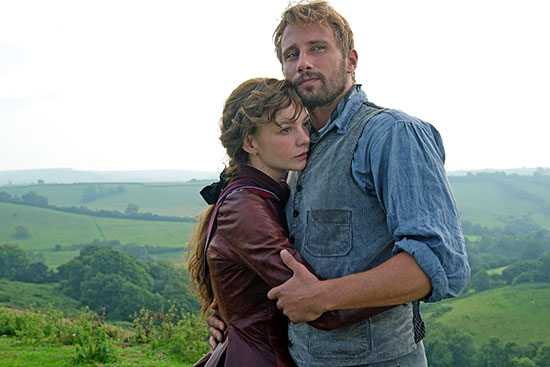
2015 brings another version of the costume drama, with Carey Mulligan, Matthias Schoenaerts and Michael Sheen. Far From the Madding Crowd (2015) is a less literal adaptation, and Mulligan plays a stronger, not-as-vain a heroine as Hardy’s Bathsheba, but the shifts in storytelling may suit a modern audience. All three versions are visually stunning and were filmed in part in Dorset, England, are well-acted and are recommended, though purists may prefer either the 1967 or 1998 period dramas.
In Victorian England, the independent and headstrong Bathsheba Everdene attracts three very different suitors: Gabriel Oak, a sheep farmer; Frank Troy, a reckless Sergeant; and William Boldwood, a prosperous and mature bachelor.
Just after watching all three versions of the period film, I came across some engravings by Alexander Anderson (1775-1870), a master illustrator who worked in wood to create images for books, periodicals, newspapers, and other commercial ephemera, using both his own designs and those of other artists. It was four years after Anderson’s passing that Hardy’s Far From the Madding Crowd first appeared (anonymously) as a monthly serial in Cornhill Magazine, so Anderson would not have had the privilege of reading it.
But Anderson would have understood the world Hardy created. Anderson was American, but born to Scottish parents, and he worked up to 1865, frequently depicting the countryside and bucolic life. Hardy set Far From the Madding Crowd in the Victorian era, in a place he called Wessex, “a merely realistic dream country,” but the people he portrays – the farmers, the land owners, the servants – were accurate representations of the people of the time.
One of Hardy’s central concerns in all of his writing was the problem of modernity in a society that was rapidly becoming more and more industrial. One of his projects as a writer was to create an account of life in the swiftly changing Dorsetshire as it had once been. He was particularly interested in the rituals and histories of that part of England, as well as the dialect of its locals. The title Far From the Madding Crowd suggests avoidance of the life of a city, modernized government, crowds and industry; in it, Hardy tries to fashion a portrait of what he saw as an endangered way of life and to create a snapshot for future generations.
I wonder if Hardy would have seen Anderson’s illustrations? In looking through Anderson’s engravings, it struck me how many seemed to represent the fictional Wessex and Far From the Madding Crowd. I thought it would be fun to share them with you, sequenced as they might have been if they were actual illustrations for the book; below are excerpts of my choice from Far From the Madding Crowd alongside Anderson’s images. To learn about the actual development of the book, see Writing, publishing and revising Far From The Madding Crowd.
In November 1872 Hardy was surprised and delighted to receive a letter from Leslie Stephen, editor of the Cornhill Magazine, inviting him to contribute a serial. Realising that this was an important opportunity, Hardy proposed a pastoral story to be called ‘Far from the Madding Crowd’, in which ‘the chief characters would probably be a young woman-farmer, a shepherd, and a sergeant of cavalry’. Almost a year later, in September 1873, he submitted the first 10 or so chapters of the novel and arrangements were made to begin publication in the January issue of the magazine. From then until the following summer he secluded himself at Bockhampton, the Dorset village where he had been born and brought up and where his parents still lived. Here, he told Stephen, he could write ‘within a walk of the district in which the incidents are supposed to occur’, jotting down ideas on large leaves or pieces of wood or stone if he had no paper to hand, and neatly tailoring the monthly instalments to the seasons of the year. The final chapters were written ‘at a gallop’ in July, and the novel published in book form on 23 November 1874, shortly before the appearance of the last magazine instalment.
Willow and Thatch’s illustrated retelling of the first part of Far From the Madding Crowd contains spoilers for the period drama adaptations – it is impossible to tell the story without them! See the bottom of the post for more information on each adaptation.

WHEN Farmer Oak smiled, the corners of his mouth spread till they were within an unimportant distance of his ears, his eyes were reduced to chinks, and diverging wrinkles appeared round them, extending upon his countenance like the rays in a rudimentary sketch of the rising sun. His Christian name was Gabriel, and on working days he was a young man of sound judgment, easy motions, proper dress, and general good character. On Sundays he was a man of misty views, rather given to postponing, and hampered by his best clothes and umbrella.
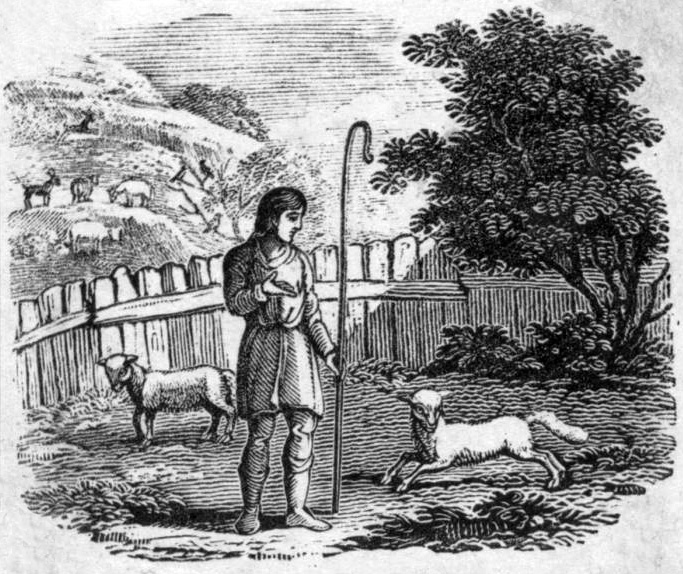
He had just reached the time of life at which “young” is ceasing to be the prefix of “man” in speaking of one. He was at the brightest period of masculine growth, for his intellect and his emotions were clearly separated: he had passed the time during which the influence of youth indiscriminately mingles them in the character of impulse, and he had not yet arrived at the stage wherein they become united again, in the character of prejudice, by the influence of a wife and family. In short, he was twenty-eight, and a bachelor.
The field he was in this morning sloped to a ridge called Norcombe Hill. Through a spur of this hill ran the highway between Emminster and Chalk-Newton. Casually glancing over the hedge, Oak saw coming down the incline before him an ornamental spring waggon, painted yellow and gaily marked, drawn by two horses, a waggoner walking alongside bearing a whip perpendicularly. The waggon was laden with household goods and window plants, and on the apex of the whole sat a woman, young and attractive.
The gatekeeper surveyed the retreating vehicle. “That’s a handsome maid,” he said to Oak.
“But she has her faults,” said Gabriel.
“True, farmer.”
“And the greatest of them is — well, what it is always.”
“Beating people down? ay, ’tis so.”
“O no.”
“What, then?”
Gabriel, perhaps a little piqued by the comely traveller’s indifference, glanced back to where he had witnessed her performance over the hedge, and said, “Vanity.”
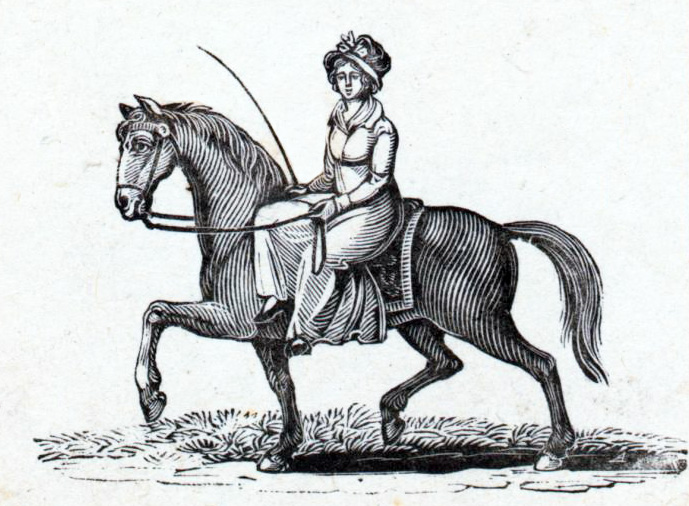
He returned to the hut, bringing in his arms a new- born lamb, consisting of four legs large enough for a full- grown sheep, united by a seemingly inconsiderable membrane about half the substance of the legs collectively, which constituted the animal’s entire body just at present. The little speck of life he placed on a wisp of hay before the small stove, where a can of milk was simmering. Oak extinguished the lantern by blowing into it and then pinching the snuff, the cot being lighted by a candle suspended by a twisted wire. A rather hard couch, formed of a few corn sacks thrown carelessly down, covered half the floor of this little habitation, and here the young man stretched himself along, loosened his woollen cravat, and closed his eyes. In about the time a person unaccustomed to bodily labour would have decided upon which side to lie, Farmer Oak was asleep.
The lamb, revived by the warmth, began to bleat, and the sound entered Gabriel’s ears and brain with an instant meaning, as expected sounds will. Passing from the profoundest sleep to the most alert wakefulness with the same ease that had accompanied the reverse operation, he looked at his watch, found that the hour-hand had shifted again, put on his hat, took the lamb in his arms, and carried it into the darkness. After placing the little creature with its mother, he stood and carefully examined the sky, to ascertain the time of night from the altitudes of the stars.
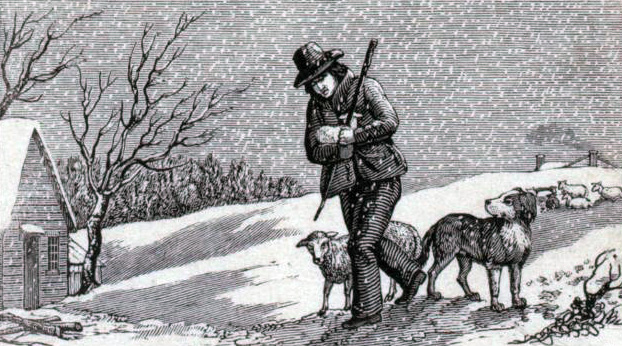
THE sluggish day began to break. She came, the pail in one hand, hanging against her knee. That the girl’s thoughts hovered about her face and form as soon as she caught Oak’s eyes conning the same page was natural, and almost certain. The self-consciousness shown would have been vanity if a little more pronounced, dignity if a little less. Rays of male vision seem to have a tickling effect upon virgin faces in rural districts; she brushed hers with her hand, as if Gabriel had been irritating its pink surface by actual touch, and the free air of her previous movements was reduced at the same time to a chastened phase of itself. Yet it was the man who blushed, the maid not at all.
“I found a hat,” said Oak.
“It is mine,” said she, and, from a sense of proportion, kept down to a small smile an inclination to laugh distinctly: “it flew away last night.”
“I wanted my hat this morning.” she went on. “I had to ride to Tewnell Mill.”
“Yes you had.”
“How do you know?”
“I saw you.”
“Where?” she inquired, a misgiving bringing every muscle of her lineaments and frame to a standstill.
“Now find out my name,” she said, teasingly; and withdrew.
By making inquiries he found that the girl’s name was Bathsheba Everdene.
THE only superiority in women that is tolerable to the rival sex is, as a rule, that of the unconscious kind; but a superiority which recognizes itself may sometimes please by suggesting possibilities of capture to the subordinated man. This well-favoured and comely girl soon made appreciable inroads upon the emotional constitution of young Farmer Oak. Love, being an extremely exacting usurer (a sense of exorbitant profit, spiritually, by an exchange of hearts, being at the bottom of pure passions, as that of exorbitant profit, bodily or materially, is at the bottom of those of lower atmosphere), every morning Oak’s feelings were as sensitive as the money-market in calculations upon his chances.
Gabriel had reached a pitch of existence he never could have anticipated a short time before. He liked saying “Bathsheba” as a private enjoyment instead of whistling; turned over his taste to black hair, though he had sworn by brown ever since he was a boy, isolated himself till the space he filled in the public eye was contemptibly small. Love is a possible strength in an actual weakness. Marriage transforms a distraction into a support, the power of which should be, and happily often is, in direct proportion to the degree of imbecility it supplants. Oak began now to see light in this direction, and said to himself, “I’ll make her my wife, or upon my soul I shall be good for nothing!”
Oak stood still — and the runner drew nearer. It was Bathsheba Everdene. Gabriel’s colour deepened: hers was already deep, not, as it appeared, from emotion, but from running.
“Farmer Oak — I —-” she said, pausing for want of breath, pulling up in front of him with a slanted face and putting her hand to her side.
“I have just called to see you,” said Gabriel, pending her further speech.
“Yes — I know that,” she said panting like a robin, her face red and moist from her exertions, like a peony petal before the sun dries off the dew. “I didn’t know you had come to ask to have me, or I should have come in from the garden instantly. I ran after you to say — that my aunt made a mistake in sending you away from courting me —-“
Gabriel expanded. “I’m sorry to have made you run so fast, my dear,” he said, with a grateful sense of favours to come. “Wait a bit till you’ve found your breath.”
“– It was quite a mistake-aunt’s telling you I had a young man already,” Bathsheba went on. “I haven’t a sweetheart at all — and I never had one, and I thought that, as times go with women, it was SUCH a pity to send you away thinking that I had several.”
“Really and truly I am glad to hear that!” said Farmer Oak, smiling one of his long special smiles, and blushing with gladness. He held out his hand to take hers, which, when she had eased her side by pressing it there, was prettily extended upon her bosom to still her loud-beating heart. Directly he seized it she put it behind her, so that it slipped through his fingers like an eel.”
“I have a nice snug little farm,” said Gabriel, with half a degree less assurance than when he had seized her hand.
“Yes; you have.”
“A man has advanced me money to begin with, but still, it will soon be paid off, and though I am only an every-day sort of man, I have got on a little since I was a boy.” Gabriel uttered “a little” in a tone to show her that it was the complacent form of “a great deal.” He continued: “When we be married, I am quite sure I can work twice as hard as I do now.”
He went forward and stretched out his arm again. Bathsheba had overtaken him at a point beside which stood a low stunted holly bush, now laden with red berries. Seeing his advance take the form of an attitude threatening a possible enclosure, if not compression, of her person, she edged off round the bush.
“Why, Farmer Oak,” she said, over the top, looking at him with rounded eyes, “I never said I was going to marry you.”
“Well — that IS a tale!” said Oak, with dismay.” To run after anybody like this, and then say you don’t want him!”
THE news which one day reached Gabriel, that Bathsheba Everdene had left the neighbourhood, had an influence upon him which might have surprised any who never suspected that the more emphatic the renunciation the less absolute its character.
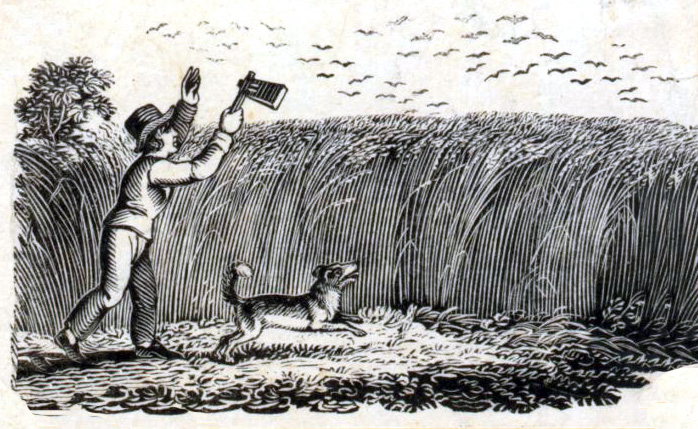
Gabriel had two dogs. The young dog, George’s son, might possibly have been the image of his mother, for there was not much resemblance between him and George. He was learning the sheep-keeping business, so as to follow on at the flock when the other should die, but had got no further than the rudiments as yet — still finding an insuperable difficulty in distinguishing between doing a thing well enough and doing it too well.
It was a still, moist night. Just before dawn he was assisted in waking by the abnormal reverberation of familiar music. To the shepherd, the note of the sheep-bell, like the ticking of the clock to other people, is a chronic sound that only makes itself noticed by ceasing or altering in some unusual manner from the well-known idle twinkle which signifies to the accustomed ear, however distant, that all is well in the fold. In the solemn calm of the awakening morn that note was heard by Gabriel, beating with unusual violence and rapidity. This exceptional ringing may be caused in two ways — by the rapid feeding of the sheep bearing the bell, as when the flock breaks into new pasture, which gives it an intermittent rapidity, or by the sheep starting off in a run, when the sound has a regular palpitation. The experienced ear of Oak knew the sound he now heard to be caused by the running of the flock with great velocity.
He jumped out of bed, dressed, tore down the lane through a foggy dawn, and ascended the hill. The forward ewes were kept apart from those among which the fall of lambs would be later, there being two hundred of the latter class in Gabriel’s flock. These two hundred seemed to have absolutely vanished from the hill. There were the fifty with their lambs, enclosed at the other end as he had left them, but the rest, forming the bulk of the flock, were nowhere.
A horrible conviction darted through Oak. With a sensation of bodily faintness he advanced: at one point the rails were broken through, and there he saw the footprints of his ewes. The dog came up, licked his hand, and made signs implying that he expected some great reward for signal services rendered. Oak looked over the precipice. The ewes lay dead and dying at its foot — a heap of two hundred mangled carcasses, representing in their condition just now at least two hundred more.
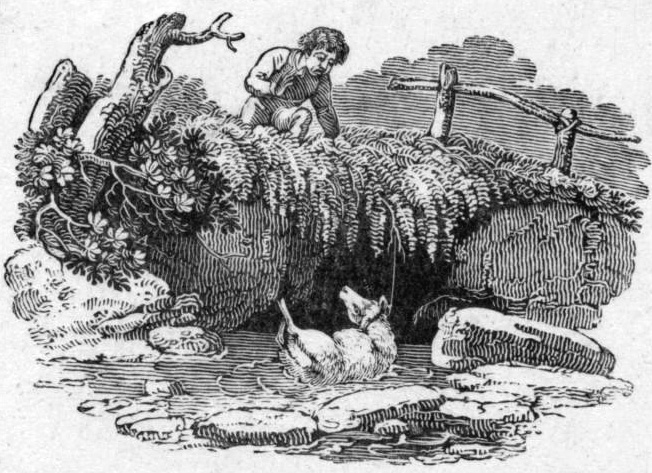
Oak was an intensely humane man: indeed, his humanity often tore in pieces any politic intentions of his which bordered on strategy, and carried him on as by gravitation. A shadow in his life had always been that his flock ended in mutton — that a day came and found every shepherd an arrant traitor to his defenseless sheep. His first feeling now was one of pity for the untimely fate of these gentle ewes and their unborn lambs.
It was a second to remember another phase of the matter. The sheep were not insured. All the savings of a frugal life had been dispersed at a blow; his hopes of being an independent farmer were laid low — possibly for ever. Gabriel’s energies, patience, and industry had been so severely taxed during the years of his life between eighteen and eight-and-twenty, to reach his present stage of progress, that no more seemed to be left in him. He leant down upon a rail, and covered his face with his hands.
Stupors, however, do not last for ever, and Farmer Oak recovered from his. It was as remarkable as it was characteristic that the one sentence he uttered was in thankfulness:
“Thank God I am not married: what would she have done in the poverty now coming upon me!”
TWO months passed away. Eating his last slices of bread and ham, and drinking from the bottle of cider he had taken the precaution to bring with him, he got into the lonely waggon. Here he spread half of the hay as a bed, and, as well as he could in the darkness, pulled the other half over him by way of bed- clothes, covering himself entirely, and feeling, physically, as comfortable as ever he had been in his life. Inward melancholy it was impossible for a man like Oak, introspective far beyond his neighbours, to banish quite, whilst conning the present untoward page of his history. So, thinking of his misfortunes, amorous and pastoral, he fell asleep, shepherds enjoying, in common with sailors, the privilege of being able to summon the god instead of having to wait for him.

Willow and Thatch thinks the best adaptation to date of Far From the Madding Crowd is the PBS Masterpiece Classic version, but each of the period dramas have their own strengths. Julie Christie is a marvel in the 1967 film, and it was novel to see the story told through a different sequence of events in the 2015 release. Watch all three!
 Far From The Madding Crowd (1967): Academy Award winner Julie Christie stars as a beautiful and fiercely independent Englishwoman of the 19th century in this lush and movingadaptation of Thomas Hardy’s classic romantic novel Far From The Madding Crowd. When proud, headstrong and unmarried Bathsheba Everdene (Christie) inherits a farm, she becomes a woman of independent means. Although three men court her, Bathsheba refuses to settle for less thana perfect suitor…which she will never find. But after she does agreeto marry, Bathsheba realizes the mistakes she has made–and the damageher actions have caused.
Far From The Madding Crowd (1967): Academy Award winner Julie Christie stars as a beautiful and fiercely independent Englishwoman of the 19th century in this lush and movingadaptation of Thomas Hardy’s classic romantic novel Far From The Madding Crowd. When proud, headstrong and unmarried Bathsheba Everdene (Christie) inherits a farm, she becomes a woman of independent means. Although three men court her, Bathsheba refuses to settle for less thana perfect suitor…which she will never find. But after she does agreeto marry, Bathsheba realizes the mistakes she has made–and the damageher actions have caused. 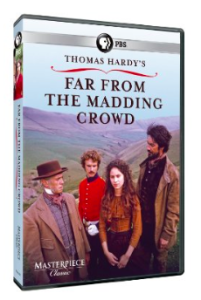
Far From the Madding Crowd (1998) Masterpiece Classic: Thomas Hardy’s Far from the Madding Crowd is a tale of passion and betrayal set in the 19th-century. Paloma Baeza stars as Bathsheba Everdene, the beautiful and capricious young woman with a fiercely independent spirit who is much admired by the men in her village. Battling for her love are the loyal and independent Gabriel Oak (Nathaniel Parker), her neighbor Farmer Boldwood (Nigel Terry), and the dashing, womanizing Sergeant Troy (Jonathan Firth), who, despite being in love with someone else, sees a challenge in Baeza and sets out to woo her.
Far From the Madding Crowd (2015): Based on the literary classic by Thomas Hardy, FAR FROM THE MADDING CROWD is the story of independent, beautiful and headstrong Bathsheba Everdene (Carey Mulligan), who attracts three very different suitors: Gabriel Oak (Matthias Schoenaerts), a sheep farmer, captivated by her fetching willfulness; Frank Troy (Tom Sturridge), a handsome and reckless Sergeant; and William Boldwood (Michael Sheen), a prosperous and mature bachelor. This timeless story of Bathsheba’s choices and passions explores the nature of relationships and love – as well as the human ability to overcome hardships through resilience and perseverance. From BBC Films and Fox Searchlight Pictures.
You may also be interested in the two adaptations of Thomas Hardy’s The Mayor of Casterbridge (1886):
The 1978 BBC dramatization of Thomas Hardy’s heart-wrenching novel is remarkably loyal to the original. The incomparable Alan Bates (Gosford Park) manages to make the mature Michael Henchard, the flawed protagonist, sympathetic, despite his galling youthful misdeeds. Anna Massey (The Importance of Being Earnest) is his poignant co-star. This literate series captures the melancholy fatalism that distinguishes Hardy’s work from that of his fellow Victorians.
Ciaran Hinds stars in the 2003 version of the tale. While the 1978 miniseries with Alan Bates is much less abridged and gives a fuller immersion into the novel and life at the time, the swiftness of this two-part adaptation makes it more immediately emotionally engaging, and the superb, compact performances by the entire cast (including Polly Walker and James Purefoy) give this version a potent punch. –Bret Fetzer

If you enjoyed this post, you’ll want to wander over to The Period Films List: the best costume dramas, heritage films, documentaries, period dramas, romances, historical reality series and period inspired movies, sorted by era and theme.



Lee Jones
April 23, 2016 at 2:23 pm (8 years ago)I’ve seen all three versions of “FAR FROM THE MADDING CROWD”. And to be honest, I love all three versions . . . even if all of them have their own little flaws. But my favorite version is the 1998 version with Paloma Baeza and Nathaniel Parker.
Frances
December 14, 2015 at 8:32 pm (8 years ago)I just now found this site. Thank you! I love the Nathanial Parker version so I have not been able to try the new movie even though I do like Cary Mulligan in Bleak House. Do you have any information on where the NP version was filmed? Can the house be toured or was it a movie set? I just found by accident Edwardian Farming and I love it. Last night I watched them thatch a coat of protective straw over their hay like Gabriel does. Anyway, thank you for your nice post.
Willow and Thatch
December 14, 2015 at 8:53 pm (8 years ago)So glad you liked it! The Nathaniel Parker version was filmed in several places – you can see the list here – but I’m not sure about the house. Thatching is so wonderful – Willow and Thatch has a whole Pinterest board for it 🙂
Evelyn
June 18, 2017 at 8:14 am (7 years ago)I would say Milligan (http://careymulligan.org/) really carries the movie, but I think its really more a combo of the setting/visuals and Schoenaerts’ Oak character. I think he nailed every small aspect of the character’s devotion and weathered work ethic. Of course also an interesting look at smaller town life for the time period….its manners, customs and ways of life for common folk whose stories have often been lost.